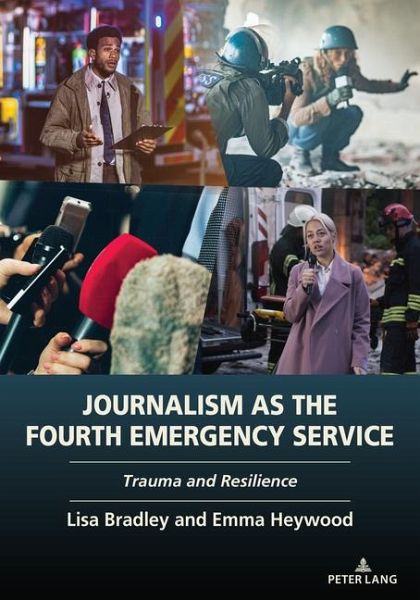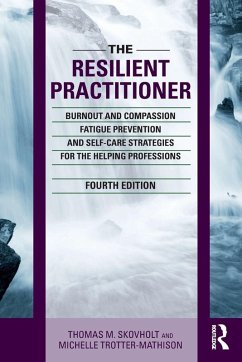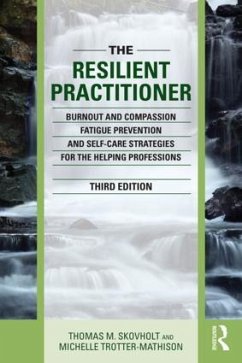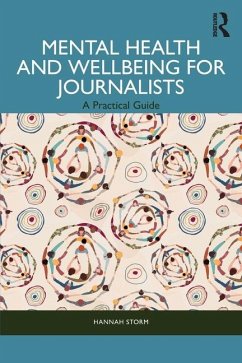
Journalism as the Fourth Emergency Service
Trauma and Resilience
Herausgegeben: Bradley, Lisa; Heywood, Emma
Versandkostenfrei!
Versandfertig in 6-10 Tagen
33,95 €
inkl. MwSt.

PAYBACK Punkte
0 °P sammeln!
Shortlisted for the MeCCSA Edited Collection Award (2025)Journalists have often been considered the "fourth emergency service". They are first on the scene, alongside paramedics, fi re and police, running towards danger rather than away, and providing independent, veritable and crucial information in the public interest. And yet, unlike frontline workers, little (if any) counselling or training is offered to journalists on how to deal with the horrors they witness, and the trauma they absorb from being at the forefront of human suffering. Further, limited to no training is given to student jou...
Shortlisted for the MeCCSA Edited Collection Award (2025)
Journalists have often been considered the "fourth emergency service". They are first on the scene, alongside paramedics, fi re and police, running towards danger rather than away, and providing independent, veritable and crucial information in the public interest. And yet, unlike frontline workers, little (if any) counselling or training is offered to journalists on how to deal with the horrors they witness, and the trauma they absorb from being at the forefront of human suffering. Further, limited to no training is given to student journalists on how to prepare themselves for trauma, be it from war scenes to the everyday "death knock". New research is demonstrating a rise in post-traumatic stress disorder amongst journalists resulting from the "everyday" trauma they encounter. There is also a noticeable increase in reluctance from new journalists to undertake emotionally distressing assignments. Editors in industry are now calling for educators to invest in curricula that centre around understanding how to cope with distress and trauma, and why work like this is vital to facilitate the work journalists do hold power to account.
This book investigates the cause and effect of trauma reporting on the journalist themselves and provides a toolkit for training journalists and practitioners to build resilience and prepare themselves for trauma. It draws on national and international experiences enabling readers to gain valuable insight into a range of contemporary issues and the contexts in which they may work.
This edited book offers a blend of academic research studies, evidence-based practitioner interviews, and teaching resources drawing on the experiences of journalists and academics nationally and internationally.
In this increasingly complex and challenging world, there is a real need to consider extra mental health support for journalists.This book is a very valuable addition to that debate.
- Ian MacGregor, Editor Emeritus at the Telegraph and Chair of the Society of Editors.
Journalists head towards danger when everyone else is running away. They see things that are the stuff of nightmares. They can be viciously trolled for telling the truth. The work is exciting and important - but there can be a heavy price to pay in trauma that can last a lifetime. This important book is essential reading for journalists and those concerned about their welfare.
- Jonathan Grun, Emeritus Editor, Press Association.
Journalism as the Fourth Emergency Service: Trauma and Resilience is a well-researched and insightful read for anyone wanting to enter the industry. The authors have carefully crafted the perfect guide to navigate new journalists through the new and ever- changing world. Their understanding and acknowledgement of the struggles and difficulties faced by journalists makes for an insightful and honest read about what to expect before entering any newsroom. I wish I had this before becoming a journalist.
- Katie Ridley, Journalist ITV Anglia.
An essential read for journalists at all stages of their career, this book is an invaluable resource for navigating the challenges both in and beyond the newsroom. It provides much- sought- after guidance that reporters have been yearning for, blending research- based insights with actionable advice - and will be beneficial for trainees and seasoned professionals alike.
- Harriet Rose Gale, Head of Features (Digital and Print), SWNS Media Group.
Journalists have often been considered the "fourth emergency service". They are first on the scene, alongside paramedics, fi re and police, running towards danger rather than away, and providing independent, veritable and crucial information in the public interest. And yet, unlike frontline workers, little (if any) counselling or training is offered to journalists on how to deal with the horrors they witness, and the trauma they absorb from being at the forefront of human suffering. Further, limited to no training is given to student journalists on how to prepare themselves for trauma, be it from war scenes to the everyday "death knock". New research is demonstrating a rise in post-traumatic stress disorder amongst journalists resulting from the "everyday" trauma they encounter. There is also a noticeable increase in reluctance from new journalists to undertake emotionally distressing assignments. Editors in industry are now calling for educators to invest in curricula that centre around understanding how to cope with distress and trauma, and why work like this is vital to facilitate the work journalists do hold power to account.
This book investigates the cause and effect of trauma reporting on the journalist themselves and provides a toolkit for training journalists and practitioners to build resilience and prepare themselves for trauma. It draws on national and international experiences enabling readers to gain valuable insight into a range of contemporary issues and the contexts in which they may work.
This edited book offers a blend of academic research studies, evidence-based practitioner interviews, and teaching resources drawing on the experiences of journalists and academics nationally and internationally.
In this increasingly complex and challenging world, there is a real need to consider extra mental health support for journalists.This book is a very valuable addition to that debate.
- Ian MacGregor, Editor Emeritus at the Telegraph and Chair of the Society of Editors.
Journalists head towards danger when everyone else is running away. They see things that are the stuff of nightmares. They can be viciously trolled for telling the truth. The work is exciting and important - but there can be a heavy price to pay in trauma that can last a lifetime. This important book is essential reading for journalists and those concerned about their welfare.
- Jonathan Grun, Emeritus Editor, Press Association.
Journalism as the Fourth Emergency Service: Trauma and Resilience is a well-researched and insightful read for anyone wanting to enter the industry. The authors have carefully crafted the perfect guide to navigate new journalists through the new and ever- changing world. Their understanding and acknowledgement of the struggles and difficulties faced by journalists makes for an insightful and honest read about what to expect before entering any newsroom. I wish I had this before becoming a journalist.
- Katie Ridley, Journalist ITV Anglia.
An essential read for journalists at all stages of their career, this book is an invaluable resource for navigating the challenges both in and beyond the newsroom. It provides much- sought- after guidance that reporters have been yearning for, blending research- based insights with actionable advice - and will be beneficial for trainees and seasoned professionals alike.
- Harriet Rose Gale, Head of Features (Digital and Print), SWNS Media Group.












